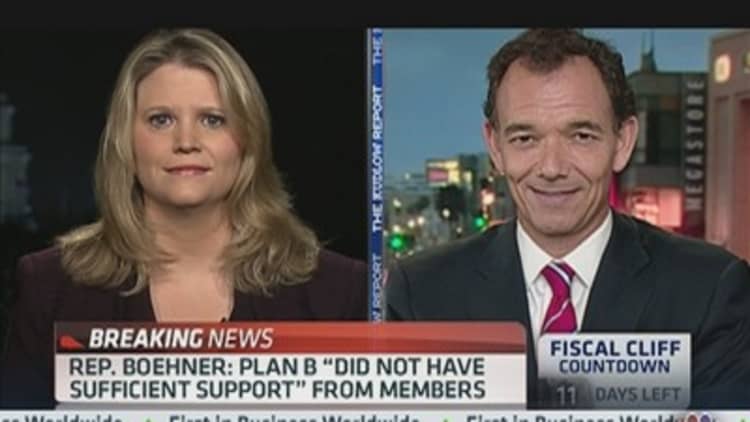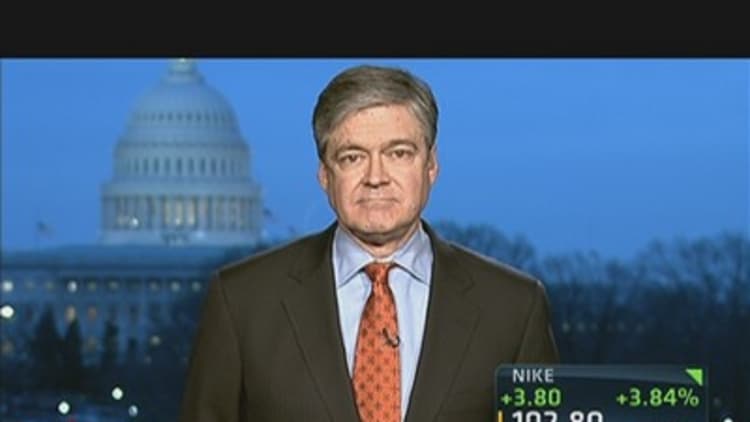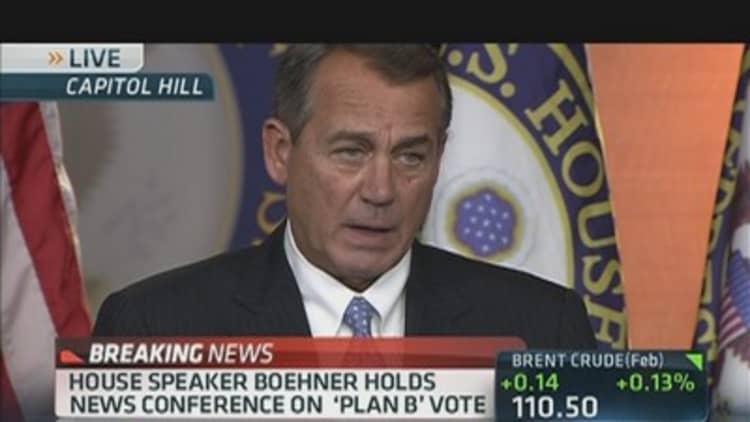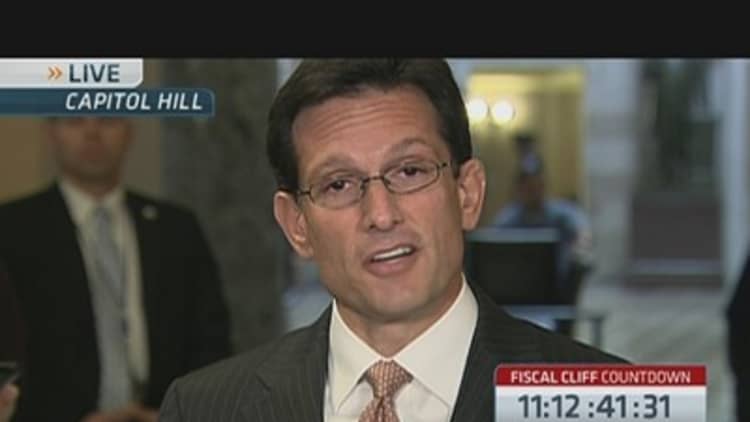Facing a rank-and-file GOP revolt, House Speaker John Boehner abruptly canceled a vote Thursday night on a plan to raise taxes for the wealthy, bringing the country closer to a plunge down the "fiscal cliff."
The House then recessed until after Christmas. The development raises questions about whether Boehner could muster support among Tea Partyers in the GOP-controlled House for a broader deal to avert the automatic tax hikes and spending cuts on Jan.1.
Senate Majority Leader Harry Reid said the sudden development showed that Boehner must now work with Democrats to try to avoid the cliff.
"Speaker Boehner's partisan approach wasted an entire week and pushed middle-class families closer to the edge," Reid said. "The only way to avoid the cliff altogether is for Speaker Boehner to return to negotiations, and work with President Obama and the Senate to forge a bipartisan deal."
According to a GOP source familiar with the vote coun, "the veto threat and opposition from the White House and the Senate Majority Leader made some members feel like they were taking a risky vote for no reason, even though the bill did not actually include a tax hike. Now, the President and Senate Majority Leader must find a solution to this crisis."
Stock future prices sank immediately after the vote cancellation, but recovered some lost ground. (Click here for the latest premarket prices.)
Boehner and House Majority Leader Eric Cantor had predicted passage of the "Plan B" bill to raise taxes on people earning over $1 million a year, despite opposition from conservatives. But in a statement Thursday night, Boehner said: "The House did not take up the tax measure today because it did not have sufficient support from our members to pass."

He said it was now up to President Barack Obama to work with Reid on legislation to avert the fiscal cliff. "The Senate must now act," Boehner said.
Emerging from a hurriedly-called evening meeting of House Republicans, Ohio Rep. Steve LaTourette said Boehner had told lawmakers he's "going to call the president and he's going to go down and talk to him and maybe they can hammer something out."
The White House said later that Obama is willing to continue bargaining for a bipartisan solution to avert the "fiscal cliff." Spokesman Jay Carney said Obama intends to work with Congress, without mentioning Boehner's failure to muster the votes for Plan B.
"The President's main priority is to ensure that taxes don't go up on 98 percent of Americans and 97 percent of small businesses in just a few short days," Carney said in a statement. "The President will work with Congress to get this done and we are hopeful that we will be able to find a bipartisan solution quickly that protects the middle class and our economy."
The sudden turn of events left precious little time for divided government to prevent across-the-board tax increases and deep spending cuts from taking effect with the new year. Economists say the combination threatened a return to recession for an economy that has been recovering slowly from the last one.
The House will not meet again until after Christmas, if then, and the Senate is expected to meet briefly on Friday, then not reconvene until next Thursday.
For the Republican leadership, trouble was signaled earlier in the afternoon, when Plan B bill only narrowly cleared a procedural hurdle. The White House had planned to veto Plan B in the unlikely event it would pass the House and the Democratic-controlled Senate. (Learn More: White House Threatens Veto.)
No matter what happened with Plan B, Boehner told reporters earlier Thursday, he would continue to try to reach a broader deal on the fiscal cliff. "Our country faces serious challenges, and the president and I in our respective roles have a responsibility to work together and get them resolved," he said. "And I expect it will continue."
Besides the Plan B bill, the House was considering a companion bill to replace across-the-board cuts in the Pentagon and some domestic programs with targeted reductions elsewhere in the budget. The move was an attempt to garner support from conservatives and other defense-minded lawmakers.

With the Jan. 1 deadline for a deal to avoid the fiscal cliff fast approaching, the House and Senate will leave for Christmas break before the weekend. Obama and Boehner could negotiate privately over the weekend with the goal of presenting a deal to Congress after Christmas. (Read More: Can a Deal Still Get Done?)
Reid said the Senate will reconvene next Thursday -- five days before the deadline. The current Congress is in session only through Jan. 2, so that is the deadline for it to approve a solution. Without an agreement, the tax increases and spending cuts would begin to go into effect and it would be up to the newly elected Congress that arrives Jan. 3 to try again for compromise.
"I say, `Enough. Enough.' The time for games is over," he said on the Senate floor.
But Reid accused Republicans of ducking the bigger issue -- the fiscal cliff. "We have nothing to discuss," he said. "It's time for the Republicans to get serious."
On Wednesday, Obama rejected Plan B, telling reporters that he and Boehner were just a few hundred billion dollars apart on a 10-year, $2 trillion-plus deficit-cutting pact. He said he hoped a comprehensive deal could be reached by Christmas. (Read More: Boehner Challenges Obama on 'Plan B.)
Obama said Republicans should "peel off the war paint" and take the deal he's offering. He noted that he had won re-election with a call for higher taxes on the wealthy, then added pointedly that the nation aches for conciliation, not a contest of ideologies, after last week's mass murder at a Connecticut elementary school.

Amid the political deadlock, Wall Street managed a modest gain Thursday. (Read More: Stocks Close Higher Despite 'Cliff' Standoff.) "The closer we get to the end of the year without a deal, the more optimism is going to evaporate," said Todd Schoenberger, managing partner at LandColt Capital in New York.
Plan B would have raised taxes on people earning over $1 million a year, sparing most workers from a tax hike but keeping painful budget cuts. White House spokesman Jay Carney called it a "multi-day exercise in futility."
Still, passage of Plan B could have given Boehner the political cover he needed to strike a deal that would break with decades of Republican anti-tax orthodoxy. "Time's running short. I'm going to do everything I can to protect as many Americans from an increase in taxes as I can," Boehner told a news conference.
Though it would not have raised taxes on as many affluent Americans as Obama wanted, the bill would have put Republicans on record as supporting a tax increase on those who earn more than $1 million per year -- a position the party opposed only weeks ago.
That could have made it easier eventually to split the difference with Obama, who wants to lower the threshold to households that earn more than $400,000 annually. Obama also faces resistance on his left flank from liberals who oppose cuts to popular benefit programs, which Republicans say must be part of any deal.
Republicans insisted they had earnestly tried to resolve the bigger fiscal issues.
"We, as Republicans, have taken concrete actions to avoid the fiscal cliff," Cantor told reporters. He expressed confidence the GOP leadership will have enough votes to pass Plan B.
"Our members understand that the nation faces the largest tax increase in its history come January 1, 2013," he said. "This bill is a bill that provides permanent tax relief for taxpayers earning a million dollars and under. We protect 99.81 percent of American taxpayers from a tax increase in these very difficult economic times."
The possibility of a ruined holiday and the absence of a grand deal left hard feelings all around. Senate Republican leader Mitch McConnell blamed the president and Democrats.Boehner countered that the president will bear responsibility for "the largest tax increase in history" if he makes good on his veto threat. "I don't think the White House has gotten serious about the big spending problem that our country faces," he said.

But to a remarkable extent, the two sides have flip-flopped.
Republicans have for years argued that voting to renew most Bush-era tax cuts on income, investments and elsewhere but allowing upper-end tax cuts to expire would be a debilitating blow to the economy and small businesses. In proposing Plan B, they pointed to the 99-plus percent of taxpayers who wouldn't be affected by it.
On paper, the two sides were relatively close to an agreement on major issues, each having offered concessions in an intensive round of talks that began late last week. (Read More: Here's How Close Boehner and Obama Are.) But political considerations are substantial, particularly for Republicans.
After two decades of resolutely opposing any tax increases, Boehner sought votes from fellow Republicans for legislation that tacitly would have let rates rise on million-dollar income tax filers. Plan B would have raised revenue by slightly more than $300 billion over a decade than if all of the Bush-era tax cuts remained in effect.
Boehner won support from anti-tax activist Grover Norquist on Wednesday, whose Americans For Tax Reform organization said it did not consider a vote for Plan B a violation of a no-tax-increase pledge that many Republicans have signed.
But another conservative group came to an opposing conclusion. "Allowing a tax increase to hit a certain segment of Americans and small businesses is not a solution; it is a political ploy," the Heritage Foundation said in a statement.

In the talks to date, Obama is now seeking $1.2 trillion in higher tax revenue, down from the $1.6 trillion he initially sought. He also has softened his demand for higher tax rates on household incomes so they would apply to incomes over $400,000 instead of the $250,000 he cited during his successful campaign for a new term.
He also has offered more than $800 billion in spending cuts over a decade, half of it from Medicare and Medicaid, $200 million from farm and other benefit programs, $100 billion from defense and $100 billion from a broad swath of government accounts ranging from parks to transportation to education.
In a key concession to Republicans, the president also has agreed to slow the rise in cost-of-living increases in Social Security and other benefit programs, at a savings estimated at about $130 billion over a decade. (Read More: How Obama Would Change Social Security Payments.)
Boehner's most recent offer on the broader fiscal cliff allowed for $1 trillion in higher taxes over a decade, with higher rates for annual incomes over $1 million. His latest offer sought about $1 trillion in spending cuts.

